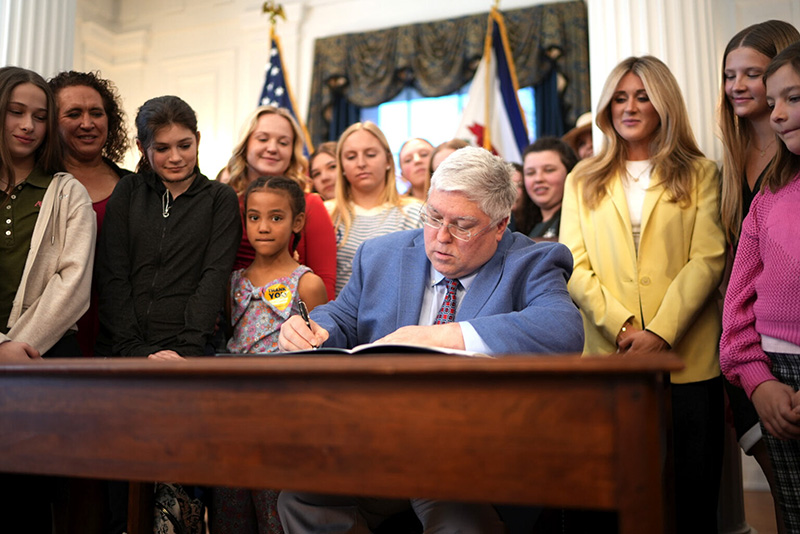Idaho Sued Over Anti-Transgender Restroom Ban
Plaintiffs argue that Idaho's new school facilities law discriminates against transgender students and violates their privacy rights.

A transgender seventh-grade student and an LGBTQ high school student organization have filed a lawsuit against Idaho state and local officials, claiming that the Gem State’s newly adopted school facilities law is unconstitutional and discriminatory against transgender individuals.
The state’s school facilities law, which was signed into law by Republican Gov. Brad Little in March and took effect beginning on July 1, requires all public and charter schools serving students in grades K-12 prohibit transgender students from accessing multi-user restrooms and other facilities that do not match their assigned sex at birth.
Beginning in 2016, various schools throughout the state adopted policies allowing transgender students to use facilities matching their gender identity, meaning that some students who previously used restrooms or locker rooms matching their gender identity, without incident, will now be barred from the very same facilities they used the previous school year.
The family of the seventh-grader and the student association argue in their lawsuit that the school facilities law discriminates against transgender students on the basis of gender identity and violates their right to privacy. The plaintiffs have also submitted a motion asking a federal judge to issue an order blocking the state from seeking to enforce the law while the case works its way through the courts.
The Idaho law specifically allows students who feel uncomfortable sharing facilities with transgender students to sue schools for $5,000 if they encounter a transgender student using a restroom that does not align with the student’s assigned sex at birth. Critics have alleged that the law puts a “bounty” on transgender students and encourages others to pursue and seek them out in order to enrich themselves monetarily.
The law mimics similar laws that have been passed in other states with Republican-controlled legislatures. Currently, seven states, including Idaho, prohibit students in K-12 schools from using gender-affirming facilities, while North Dakota and Florida have laws that go further and prohibit transgender people from accessing gender-affirming restrooms in some or all government buildings. Florida’s law also makes using restrooms that match one’s gender identity a prosecutable offense.
Two other states — Montana and Kansas — don’t have explicit bans, but do have laws on the books defining “sex” in a way that could hamper transgender individuals’ ability to access gender-affirming facilities, according to the Movement Advancement Project.
“Idaho has launched another cruel and unconstitutional attack on a vulnerable population — transgender youth,” Peter Renn, senior counsel for Lambda Legal, which is representing the plaintiffs, said in a statement. “This is not the first such attack on transgender youth, and sadly it will likely not be the last.
“It is reprehensible that anti-transgender state legislators nationwide keep singling out transgender youth for harmful, discriminatory treatment, even though court after court has repeatedly quashed this type of discrimination wherever it has popped up,” Renn added. “We are seeking immediate relief to stop this law from banishing transgender students across Idaho from using the same facilities as their peers once they return to school and turning them into outsiders in their own communities.”
Atlas Jones, the president of the Sexuality and Gender Alliance at Boise High School, which is the plaintiff organization in the case, noted that the new law reverses restroom policies that were already in place and places transgender students in a difficult situation by forcing them to either avoid using restrooms and locker rooms altogether or risk running afoul of the law.
“There is no reason to keep me and my transgender classmates from continuing to use the same school restrooms as our peers, which school policy has allowed us to do for years,” Jones said in a statement. “It would be humiliating, distracting, and exhausting to try to make it through the school day without having proper access to bathrooms.”
Support Metro Weekly’s Journalism
These are challenging times for news organizations. And yet it’s crucial we stay active and provide vital resources and information to both our local readers and the world. So won’t you please take a moment and consider supporting Metro Weekly with a membership? For as little as $5 a month, you can help ensure Metro Weekly magazine and MetroWeekly.com remain free, viable resources as we provide the best, most diverse, culturally-resonant LGBTQ coverage in both the D.C. region and around the world. Memberships come with exclusive perks and discounts, your own personal digital delivery of each week’s magazine (and an archive), access to our Member's Lounge when it launches this fall, and exclusive members-only items like Metro Weekly Membership Mugs and Tote Bags! Check out all our membership levels here and please join us today!






















You must be logged in to post a comment.